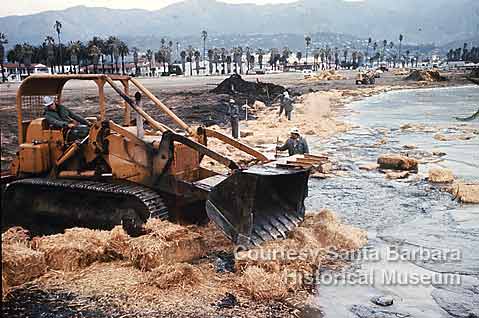Look Closer at “Environmentalism” and Economic Health
Ecology Nearer to the Point

It’s that time again. Every January since 1969, speakers, writers and aged witnesses are asked to recall the offshore oil well blowouts. They’re always asked, “What was it like?” By now, shouldn’t the question be, “Is it still relevant?”
Because I covered offshore oil for 18 years for the Santa Barbara News-Press, I’m often asked to describe the adventure. I retired in 1985 and I’d like to move on.
The event did enlist great numbers in something called environmentalism, but that was confusing because it alone is a non-word. Everyone could decide what he or she thought it meant. Environment is a real word. It means everything around us, and including us! It embraces more than natural resources. Environment can be of home, workplace, classroom, playground, battlefield, freeway, psyche, etc. It needs a modifier or a description to be meaningful. The words environmental and environmentally can be useful modifiers. But environmentalist and environmentalism without modifiers or descriptions are meaningless.
For 30 years from 1969, the “movement” flourished in citizens’ groups, environmental studies programs, environmental publications, and—God help us—environmental impact reports. The era spawned much legislation and a rush of books. Some serious writers and researchers warned that the problem was greater than environmentalists imagined: The movement neglected many ecosystem upsets that had been evident since mid-century. We were consuming and degrading resources much faster than the planet could provide or restore them. And time was fast running out.
Natural forces have cyclically produced changes in soil, oceans, fresh water, landforms, atmosphere, etc, and we have readily adapted and adjusted. But now the changes were combining the consequences of human overpopulation, industrialization, agriculture, urbanization, consumption, waste disposal, and other activity that we once regarded as progress—believing that constant “growth “ is essential for economic progress. That growth is measured by something called gross domestic product (GDP) which comprises the market value of a nation’s annual output of goods and services; in other words, how much the nation spends.
That includes the cost of war, crime, natural disasters, resource depletion, and other expenditures that do not contribute to the health of a nation’s economy but in fact are serious drags on the nation’s wellbeing. Such a depiction of a nation’s economic health has been long and widely lamented by writers and economists. Some nations have improved their calculating systems to reflect economic realities. But our Congress has rejected such attempts under the financial clout of extractive industries, primarily oil, gas and coal.
Economic growth as encouraged today—business as usual—cannot survive what ecologists call a tipping point, and what economists describe as a bubble that can be inflated only so far before bursting. But business as usual views the future in the short term. It thrives on waste and resource consumption, for as long as it can. Then it collapses or moves on, leaving devastation in its wake. Free markets are not self-correcting, and governmental regulations have fallen far short of saving natural or fiscal resources.
Applying effective management requires an understanding of ecology, an exciting and enlightening field of study. Too often, “environmentalism” considers impacts in isolation and locally, even in 10-pound impact reports. It falls short of examining how the free-market can upset complex ecosystems and drastically change natural environments. That requires ecology, the quest to understand how all these forces interact, and demonstrates the consequences of these systems in collision, competition, or cooperation.
The quest for oil offshore Santa Barbara in 1969 is an excellent example of an ecological upset, even before the well blew out in 1969. The enormous consumption of oil in the first half of the century set off a disastrous change in the earth’s atmosphere, with all its complications. In the scramble for oil, the ocean bottom crust was penetrated here without adequate geological knowledge of the consequences. Regulations were inadequate at the start, and to speed up production the federal government relaxed even those controls at the oil company’s request. This was the vaulted “market economy” approach to consuming natural resources. The inability to stop the blowout once the fragile ocean-bottom crust was shattered was matched by the failure to cope with the oil in the ocean and on the beaches. It took months to clean the beaches with straw, and the ocean habitat cleanup was left largely to nature. The free-market system was designed to “manage” nature rather than to adapt to its immutable laws.
There are better things to do than dwell on the past. The “environmental” movement in this county has recently adopted many ecological approaches to produce clean energy and non-destructive uses of land, water, and air. These efforts should be more widely recognized than an annual replay of oil well blowouts to illustrate “What was it like?”



